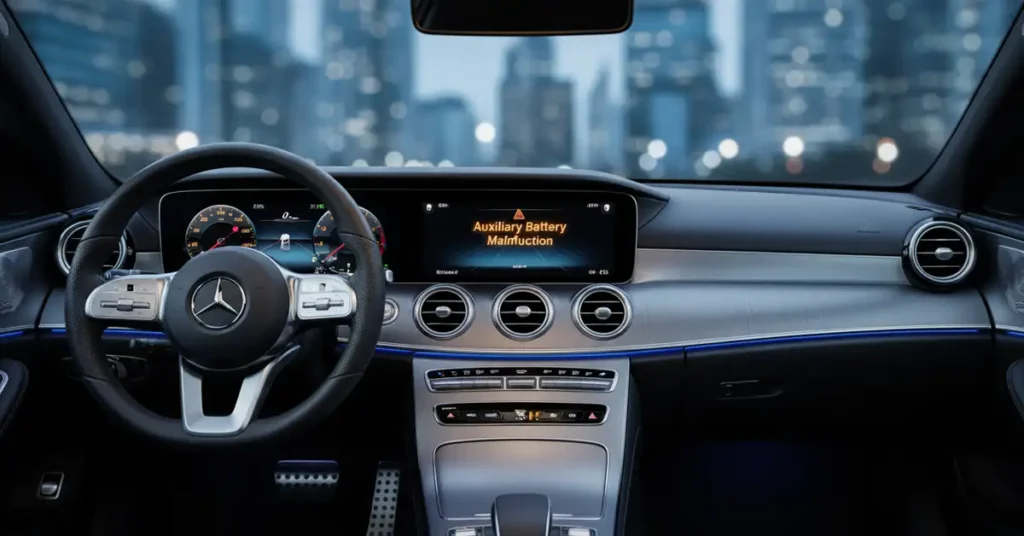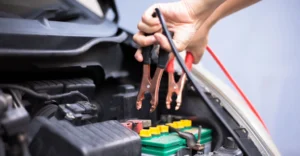If you drive a Mercedes-Benz, you might have noticed a message pop up on your dashboard saying, “Auxiliary Battery Malfunction.” At first glance, it can be alarming, leaving you to wonder whether your car is about to fail. But what exactly does this warning mean, why does it appear, and how can you address it? Understanding the role of the auxiliary battery in Mercedes vehicles is essential to keeping your car reliable and avoiding unexpected electrical issues.
In this guide, we break down what the auxiliary battery does, where it’s located, and how it differs from the main battery. We also explain the most common causes of a malfunction, the warning signs you should never ignore, and the steps to diagnose and fix the problem efficiently.
What Does Auxiliary Battery Malfunction Mean?
The “Auxiliary Battery Malfunction” warning indicates that the secondary battery system in your Mercedes is not functioning correctly. Unlike the main 12-volt starter battery that powers the engine, the auxiliary battery supports secondary functions. This includes powering electrical systems such as the infotainment system, radio, climate control, or even the engine’s stop-start system.
When the voltage of the auxiliary battery drops below a safe threshold, the car’s monitoring system detects the inefficiency and triggers the dashboard warning. Ignoring this alert could eventually lead to minor or major electrical failures, depending on the components relying on the battery.
Understanding the Mercedes Auxiliary Battery
Mercedes-Benz began installing auxiliary batteries in the early 2000s. These batteries are smaller than the main starter battery, sometimes referred to as capacitors due to their size. While they cannot start the engine, they are essential for maintaining electrical stability and supporting high-tech features in modern vehicles.
Key points about auxiliary batteries:
- Serve as a backup to the main battery for secondary electrical systems
- Power infotainment systems, radios, and stop-start engine systems
- Charge automatically when the engine runs
- Lifespan ranges between four and six years
Replacing an old auxiliary battery before it fails can prevent inconvenient warning messages or loss of electrical functions.
Where is the Auxiliary Battery Located in a Mercedes?
Mercedes-Benz installs the auxiliary battery in different locations depending on the model. Knowing its location is essential if you plan to inspect or replace it. Common locations include:
- Engine bay near the windshield
- Under the front passenger seat
- Inside the dashboard on the driver’s side
- Trunk or behind the rear seats
If you cannot locate it, your vehicle’s service manual provides the exact position, and many online diagrams are available for reference.
Main Battery vs. Auxiliary Battery
Mercedes vehicles have both a main battery, sometimes called the starter battery or G1, and an auxiliary battery, also known as G1/7. Understanding the difference is key:
- Main Battery (G1): Starts the engine and provides primary power to all electrical systems
- Auxiliary Battery (G1/7): Supports secondary electrical components, often an AGM battery or capacitor
- The auxiliary battery does not start the engine but stabilizes voltage and powers electronics
A failing main battery results in a car that won’t start, whereas an auxiliary battery malfunction may only cause electrical quirks until it is addressed.
Symptoms of Auxiliary Battery Malfunction
Recognizing the early signs of a failing auxiliary battery can save time and money. Common symptoms include:
- Dashboard warning light showing “Auxiliary Battery Malfunction”
- Trouble with infotainment systems, radios, or climate controls
- Error code 9062 on a diagnostic scanner, indicating a defective or missing auxiliary battery
- Electrical features behaving erratically, such as slow or unresponsive screens
Unlike a dead main battery, your Mercedes will continue running normally, but the vehicle’s electronic stability may be compromised.
Common Causes of Auxiliary Battery Malfunction
Several factors can trigger the auxiliary battery warning, including:
1. Defective Auxiliary Battery
Aging batteries lose their ability to hold a charge. If your auxiliary battery is more than four years old, replacement is often the simplest solution.
2. Malfunctioning Auxiliary Battery Relay
The relay controls when the auxiliary battery should charge. If it fails, the battery stops charging, and the warning light comes on.
3. Faulty Poly-Switch Fuse
This resettable fuse protects the battery from electrical surges. A malfunctioning Poly-Switch fuse can trigger the warning light.
4. Defective Battery Control Module
This module monitors voltage levels of both batteries. A failure can illuminate the auxiliary battery warning and sometimes the main battery warning as well.
5. CAN Bus Communication Issues
Wiring problems or loose connectors in the vehicle’s controller area network can mimic a battery malfunction. It rarely indicates a fault with the network itself.
How to Fix an Auxiliary Battery Malfunction
Addressing this issue involves systematic diagnosis. Here is a step-by-step approach:
1. Scan Trouble Codes
Use an OBD scanner to check for error codes. Resetting the codes and performing a short drive may help isolate the problem.
2.Replace the Auxiliary Battery
If the codes point to a failing battery, replace it with the correct specification. Mercedes-compatible batteries are recommended for reliability.
3. Inspect Electrical System
Examine the relay, Poly-Switch fuse, and wiring. Refer to your service manual for guidance. Repair any damaged components or connections.
4. Consult a Professional
If the problem persists, a Mercedes-certified technician can diagnose more complex electrical issues that require specialized tools and expertise.
Driving with a Bad Auxiliary Battery
You can drive a Mercedes with a malfunctioning auxiliary battery, but it is not recommended. While the main battery continues to power the car, some electrical features may fail unpredictably. Addressing the issue promptly ensures your vehicle remains fully functional and avoids potential damage to sensitive electronics.
Frequently Asked Questions
Can the alternator charge the auxiliary battery?
Yes, the alternator charges both the main and auxiliary batteries while the engine is running. The auxiliary battery relay controls when charging occurs.
Do I have to use a Mercedes auxiliary battery?
Not necessarily, but it is important to match the specifications carefully. For safety and reliability, Mercedes-approved batteries are recommended.
What happens if the auxiliary battery dies?
You may see the warning light and error code 9062, with potential malfunctions in infotainment, radios, and other electrical components.
How long does a Mercedes auxiliary battery last?
Typically, 4 to 6 years. Replacing it before failure avoids unexpected warning messages and electrical issues.
MotorHub UAE Automotive Support
In the UAE, extreme heat and high humidity can accelerate wear on your Mercedes’ batteries and electrical systems. At MotorHub, we provide specialized diagnostics and maintenance for luxury vehicles, including battery inspections, relay testing, and advanced electrical troubleshooting. Our certified technicians ensure your Mercedes remains reliable on both city streets and desert highways. Regular preventive checks, especially on auxiliary batteries and high-tech electrical systems, are essential to maximize performance and avoid expensive repairs.



